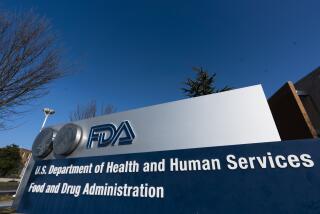BODY WATCH : Gene Tests: The Good, the Bad and the Debates
- Share via
BALTIMORE — Researchers summoned a woman to an office at the Johns Hopkins School of Public Health last spring to tell her the bad news. They had found a genetic threat lurking in her 7-year-old son’s DNA--a mutant gene that almost always triggers a rare form of colon cancer.
It was the same illness that led to removal of her colon in 1979.
While the boy, Michael, now 8, is still perfectly healthy, without surgery he is almost certain to develop cancer by 40.
“I didn’t think he was going to have it. I really didn’t,” Susan B., 43, recalled recently, her green eyes welling with tears. (She asked that her last name not be used to protect her family’s privacy.) “But God answers prayers the way he has to. I accepted it. And we’re going to work with it.”
This genetic fortunetelling was no parlor trick. It was the product of astonishing advances in recent decades in understanding how genes build and regulate our bodies. And as scientists pinpoint new genes and learn to forecast the onset of more inherited disorders, millions of people are likely to demand their medical prognosis.
Some genetic specialists are worried. Gene tests can be powerful tools for the diagnosis, study and treatment of disease. But if they are casually prescribed, botched by laboratories or not understood by those who take them, the tests could do more harm than good.
“I think this technology has enormous promise to benefit people,” said Dr. Francis Collins, director of the National Center for Human Genome Research, which is leading the United States’ $3-billion attempt to identify the 60,000 to 80,000 human genes. “But it’s also powerful information which, if used incorrectly, could injure people,” he warned.
To prevent abuse, genome project officials picked Dr. Neil A. Holtzman, a Johns Hopkins pediatrician and genetics specialist, to lead a task force on genetic testing.
The 21-member task force, which held its first meeting in April, is expected to recommend ways the Food and Drug Administration can regulate these tests. Their report is due in two years.
Holtzman, 61, led the first pediatric genetics unit at Hopkins in the early 1970s. He worked on a study of one of the earliest genetic screening efforts, the testing of newborns for a condition known as phenylketonuria, or PKU.
Today, the number of tests is multiplying as scientists around the country race to track down the genetic roots of illnesses.
“Once you identify a genetic mutation, as part of that discovery you also have a test to see if other people also carry that mutation,” Holtzman said.
Susan is glad her son was tested for the FAP-causing gene. “It’s not a death sentence for him,” she said. He’ll have frequent examinations, and if and when symptoms of cancer appear, she said, he’ll have surgery. “The downside was just knowing he has the gene,” she said.






